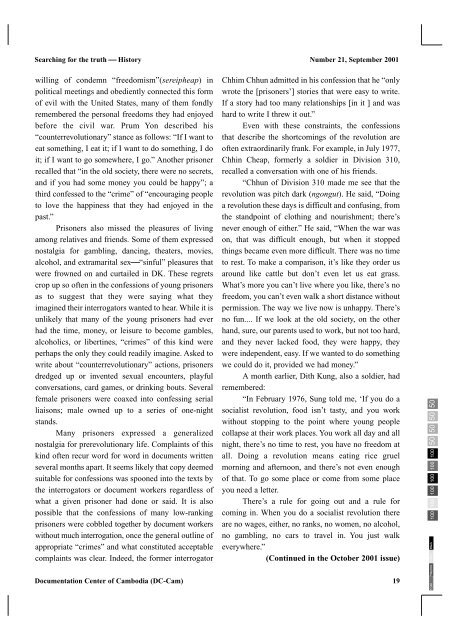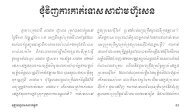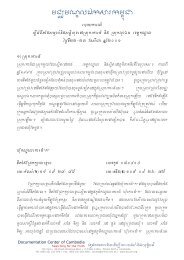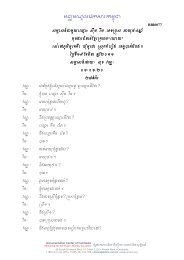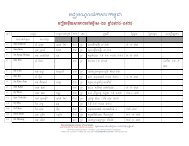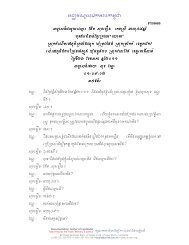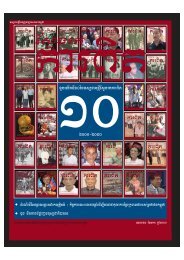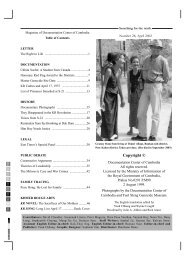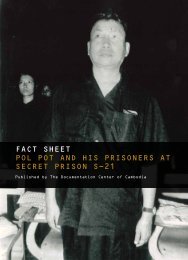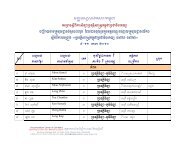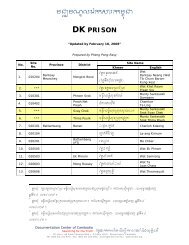Searching for the truth Issues 21 - Documentation Center of Cambodia
Searching for the truth Issues 21 - Documentation Center of Cambodia
Searching for the truth Issues 21 - Documentation Center of Cambodia
You also want an ePaper? Increase the reach of your titles
YUMPU automatically turns print PDFs into web optimized ePapers that Google loves.
<strong>Searching</strong> <strong>for</strong> <strong>the</strong> <strong>truth</strong> ⎯ History<br />
willing <strong>of</strong> condemn “freedomism”(sereipheap) in<br />
political meetings and obediently connected this <strong>for</strong>m<br />
<strong>of</strong> evil with <strong>the</strong> United States, many <strong>of</strong> <strong>the</strong>m fondly<br />
remembered <strong>the</strong> personal freedoms <strong>the</strong>y had enjoyed<br />
be<strong>for</strong>e <strong>the</strong> civil war. Prum Yon described his<br />
“counterrevolutionary” stance as follows: “If I want to<br />
eat something, I eat it; if I want to do something, I do<br />
it; if I want to go somewhere, I go.” Ano<strong>the</strong>r prisoner<br />
recalled that “in <strong>the</strong> old society, <strong>the</strong>re were no secrets,<br />
and if you had some money you could be happy”; a<br />
third confessed to <strong>the</strong> “crime” <strong>of</strong> “encouraging people<br />
to love <strong>the</strong> happiness that <strong>the</strong>y had enjoyed in <strong>the</strong><br />
past.”<br />
Prisoners also missed <strong>the</strong> pleasures <strong>of</strong> living<br />
among relatives and friends. Some <strong>of</strong> <strong>the</strong>m expressed<br />
nostalgia <strong>for</strong> gambling, dancing, <strong>the</strong>aters, movies,<br />
alcohol, and extramarital sex⎯“sinful” pleasures that<br />
were frowned on and curtailed in DK. These regrets<br />
crop up so <strong>of</strong>ten in <strong>the</strong> confessions <strong>of</strong> young prisoners<br />
as to suggest that <strong>the</strong>y were saying what <strong>the</strong>y<br />
imagined <strong>the</strong>ir interrogators wanted to hear. While it is<br />
unlikely that many <strong>of</strong> <strong>the</strong> young prisoners had ever<br />
had <strong>the</strong> time, money, or leisure to become gambles,<br />
alcoholics, or libertines, “crimes” <strong>of</strong> this kind were<br />
perhaps <strong>the</strong> only <strong>the</strong>y could readily imagine. Asked to<br />
write about “counterrevolutionary” actions, prisoners<br />
dredged up or invented sexual encounters, playful<br />
conversations, card games, or drinking bouts. Several<br />
female prisoners were coaxed into confessing serial<br />
liaisons; male owned up to a series <strong>of</strong> one-night<br />
stands.<br />
Many prisoners expressed a generalized<br />
nostalgia <strong>for</strong> prerevolutionary life. Complaints <strong>of</strong> this<br />
kind <strong>of</strong>ten recur word <strong>for</strong> word in documents written<br />
several months apart. It seems likely that copy deemed<br />
suitable <strong>for</strong> confessions was spooned into <strong>the</strong> texts by<br />
<strong>the</strong> interrogators or document workers regardless <strong>of</strong><br />
what a given prisoner had done or said. It is also<br />
possible that <strong>the</strong> confessions <strong>of</strong> many low-ranking<br />
prisoners were cobbled toge<strong>the</strong>r by document workers<br />
without much interrogation, once <strong>the</strong> general outline <strong>of</strong><br />
appropriate “crimes” and what constituted acceptable<br />
complaints was clear. Indeed, <strong>the</strong> <strong>for</strong>mer interrogator<br />
<strong>Documentation</strong> <strong>Center</strong> <strong>of</strong> <strong>Cambodia</strong> (DC-Cam)<br />
Number <strong>21</strong>, September 2001<br />
Chhim Chhun admitted in his confession that he “only<br />
wrote <strong>the</strong> [prisoners’] stories that were easy to write.<br />
If a story had too many relationships [in it ] and was<br />
hard to write I threw it out.”<br />
Even with <strong>the</strong>se constraints, <strong>the</strong> confessions<br />
that describe <strong>the</strong> shortcomings <strong>of</strong> <strong>the</strong> revolution are<br />
<strong>of</strong>ten extraordinarily frank. For example, in July 1977,<br />
Chhin Cheap, <strong>for</strong>merly a soldier in Division 310,<br />
recalled a conversation with one <strong>of</strong> his friends.<br />
“Chhun <strong>of</strong> Division 310 made me see that <strong>the</strong><br />
revolution was pitch dark (ngongut). He said, “Doing<br />
a revolution <strong>the</strong>se days is difficult and confusing, from<br />
<strong>the</strong> standpoint <strong>of</strong> clothing and nourishment; <strong>the</strong>re’s<br />
never enough <strong>of</strong> ei<strong>the</strong>r.” He said, “When <strong>the</strong> war was<br />
on, that was difficult enough, but when it stopped<br />
things became even more difficult. There was no time<br />
to rest. To make a comparison, it’s like <strong>the</strong>y order us<br />
around like cattle but don’t even let us eat grass.<br />
What’s more you can’t live where you like, <strong>the</strong>re’s no<br />
freedom, you can’t even walk a short distance without<br />
permission. The way we live now is unhappy. There’s<br />
no fun.... If we look at <strong>the</strong> old society, on <strong>the</strong> o<strong>the</strong>r<br />
hand, sure, our parents used to work, but not too hard,<br />
and <strong>the</strong>y never lacked food, <strong>the</strong>y were happy, <strong>the</strong>y<br />
were independent, easy. If we wanted to do something<br />
we could do it, provided we had money.”<br />
A month earlier, Dith Kung, also a soldier, had<br />
remembered:<br />
“In February 1976, Sung told me, ‘If you do a<br />
socialist revolution, food isn’t tasty, and you work<br />
without stopping to <strong>the</strong> point where young people<br />
collapse at <strong>the</strong>ir work places. You work all day and all<br />
night, <strong>the</strong>re’s no time to rest, you have no freedom at<br />
all. Doing a revolution means eating rice gruel<br />
morning and afternoon, and <strong>the</strong>re’s not even enough<br />
<strong>of</strong> that. To go some place or come from some place<br />
you need a letter.<br />
There’s a rule <strong>for</strong> going out and a rule <strong>for</strong><br />
coming in. When you do a socialist revolution <strong>the</strong>re<br />
are no wages, ei<strong>the</strong>r, no ranks, no women, no alcohol,<br />
no gambling, no cars to travel in. You just walk<br />
everywhere.”<br />
(Continued in <strong>the</strong> October 2001 issue)<br />
19<br />
100 100 100 100 100 100 50 50 50 50<br />
Black<br />
Yellow<br />
Magenta<br />
Cyan


